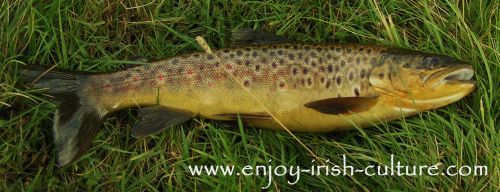Fly Fishing Irish Lakes- Lough Corrib-
The early part of the fishing season in February and March
Join me on an adventure- fly fishing an Irish lake- Lough Corrib. I'll talk you through the fun to be had during the early part of the season in this article.
I have the good fortune to live five minutes from Annaghdown Pier on the shores of the worlds’ best wild brown trout fishery, Lough
Corrib. Lough Corrib is over 30 miles long and 7 miles across. Opening
day on the Corrib is February 15th.
Annaghdown Pier, February
Options for the very early season
At
the beginning of the season most of the fish are caught on spinners or using a dead minnow
or ‘ brickeen’, as they are known locally. ‘Brickeen’ fishing is a traditional method particular to Lough Corrib. Brickeen fishing involves trolling a minnow on a specially designed rig behind the boat. In the 'olden days' the fishermen used hazel poles with a bell on the end.
The fly life is not so abundant at this stage, but fish are still caught by fly fishing. Fly Anglers concentrate on the shallower, warmer bays
which are located on the lower southern end of the lake. Places such as Annaghdown Bay can be relatively productive on warmer February days. Small black flies can be useful, the kind that imitate fry such as The bloody butcher. Choose flies which imitate aquatic insects that appear at this time of year, such as the Black Pennel but at this stage of the season don't shy away from trying brickeen fishing or spinning.
The first big hatch-Duck fly and Olive
You start to do fly fishing on Irish lakes around March time. The first big hatch of flies takes place around mid-March
and continues to about mid-April with the ‘duck fly’, signalling the start of
serious fly fishing. A lot of anglers traditionally start fishing on March 17th,
St Patrick’s Day, using the Duck Fly. The ‘Duck fly ‘ is a chironomid, or buzzer, as they are also
known.

Chironomids are a large family of flies, which are
essentially large non-biting midges. They resemble mosquitos. I found out why
they are referred to as buzzers one evening on the lake as I wiped a mass of
noisy flies from my glasses in order to be able to see. It was an awesome
experience, out there on the calm water watching the sun go down and the full
moon rise in a pink sky over the lake. Out of the tranquil silence, there grew
a faint hum which quickly built to a serious buzz as the flies arrived. The
water was soon boiling with rising trout making the most of the feast. These
buzzers were a later species which hatch slightly later in the season on warm
evenings in late May/early June.
Fishing in Ireland is a great adventure! Tight lines! Regards, Colm
Read More About Fishing In Ireland
More On Irish Culture
Hi there, like what you just read about fly fishing Irish lakes?
Why not tell the whole world about our website so that others may enjoy it, too?! We have provided handy social functions at the top left and bottom of every page for your convenience.
Thank you so much and warmest regards from Susanna and Colm.
Return to the top of this page
Return to the Fishing overview page.
We invest a lot of our own funds and free time into this website so that you can find out about Irish culture, heritage and history.
Please return the favour and help us cover our cost by clicking on Google ads and/ or buying us a cup of coffee! Thank you so much in advance.
Warmest regards, Colm & Susanna
|
|
|
|
Enjoy this page? Please pay it forward. Here's how...
Would you prefer to share this page with others by linking to it?
- Click on the HTML link code below.
- Copy and paste it, adding a note of your own, into your blog, a Web page, forums, a blog comment,
your Facebook account, or anywhere that someone would find this page valuable.
|
|
|
|
- Home
Customs and Traditions
Travel
Music
Heritage
About This Website